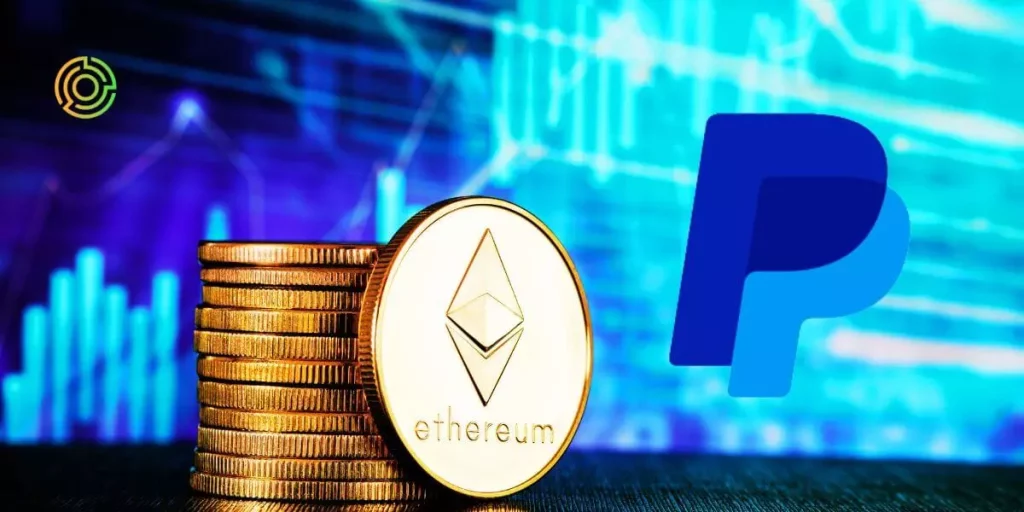The recent launch of PayPal’s new PYUSD stablecoin built on Ethereum is poised to directly benefit the blockchain’s adoption and decentralized finance (DeFi) ecosystem. According to analysts, PayPal’s move represents a milestone for mainstream embrace of crypto and validation of Ethereum’s leadership.
PYUSD aims to integrate digital assets into PayPal’s vast traditional finance network. It could significantly expand real-world cryptocurrency utility. But the Ethereum-based stablecoin also provides unique advantages for the blockchain itself.
As a digital native dollar integration for PayPal’s hundreds of millions of users, PYUSD may bring billions in value transfer to Ethereum. This would increase demand for ETH, drive up DeFi platform activity, and validate Ethereum’s dominance as the blockchain for enterprise adoption.
Bringing New Value and Utility to Ethereum
JPMorgan analysts noted PYUSD may fill the $20 billion void left by sanctions on the major BUSD stablecoin earlier this year. If so, decentralized finance (DeFi) total value locked (TVL) would shift from Binance Smart Chain to Ethereum and its layer 2 platforms.
This alone represents potentially tens of billions in value migrating to Ethereum through PayPal’s stablecoin initiative. As more assets collateralize lending protocols, liquidity pools, and other DeFi services on Ethereum, it improves the blockchain’s utility and role in digital finance.
PYUSD’s integration into PayPal’s checkout, remittances, bill pay and other services also drives incremental transaction volumes on Ethereum. This benefits ETH as its native token and secures Ethereum’s advantage for enterprise blockchain adoption.
Validating Ethereum’s Leadership as the Stablecoin Blockchain
PayPal choosing to issue PYUSD on Ethereum over other blockchains signals meaningful validation. As one of the largest traditional finance companies embracing crypto, PayPal’s move endorses Ethereum as the ideal blockchain for mainstream digital asset integration.
It affirms Ethereum’s first-mover advantage for secure and time-tested smart contract capabilities necessary for institutional fintech and DeFi applications. This effect could incentivize other enterprises to build Ethereum-based financial products and services.
Ethereum also benefits from its expansive developer ecosystem creating DeFi tools primed for synergy with PYUSD. PayPal is essentially tapping into robust decentralized financial rails already built on Ethereum ready for integration.
Scalability and Fees Remain a Challenge
Critics point out that Ethereum’s high gas fees and congestion issues pose barriers to PYUSD adoption compared to other blockchains. PayPal may need to subsidize fees or build layer 2 solutions to improve usability.
However, Ethereum already handles the majority of stablecoin transaction volume due to the strength of its DeFi ecosystem. PYUSD’s incremental fees may continue lingering as growing pains during Ethereum’s ongoing scalability upgrades.
Government Stablecoin Support Could Grow With Adoption
Industry voices believe PayPal likely received assurances from regulators before launching PYUSD. Its embrace signals the U.S. government welcomes crypto integration if done responsibly by established centralized finance firms.
If adoption of PYUSD and other compliant stablecoins accelerates, regulators may incrementally provide frameworks for decentralized stablecoins as well. This would ultimately boost Ethereum’s broader DeFi capabilities.
Conclusion
PayPal USD stablecoin is a watershed development for mainstream cryptocurrency integration. Its strategic launch on Ethereum over other blockchains validates the leading smart contract network for digital asset financial services.
Billions flowing through PayPal’s crypto rails to Ethereum will increase DeFi activity and improve the blockchain’s utility. While scalability is still a challenge, PayPal’s move plants the seeds for Ethereum to thrive as the home for regulated digital finance innovation.
FAQs
How does PYUSD benefit Ethereum?
It brings billions in transaction value and collateral to Ethereum. This drives up DeFi platform usage, improves ETH demand, and cements Ethereum’s advantage for fintech blockchain adoption.
Why did PayPal choose Ethereum?
Ethereum offers the most mature smart contract capabilities and the richest surrounding DeFi ecosystem critical for digital asset financial products.
Doesn’t Ethereum have scalability issues?
Yes, but PayPal is likely willing to subsidize fees short-term knowing Ethereum is actively upgrading for better scalability and lower costs.
How does PYUSD get government approval?
As a centralized stablecoin issued by a major regulated financial company, PYUSD fits more neatly into existing compliance frameworks than decentralized tokens.
Will regulators support decentralized stablecoins?
Perhaps incrementally if governed properly. Early adoption of centralized stablecoins helps make the case for eventually approving decentralized models.
Follow us on our social networks and keep up to date with everything that happens in the Metaverse!
Twitter Linkedin Facebook Telegram Instagram Google News Amazon Store
